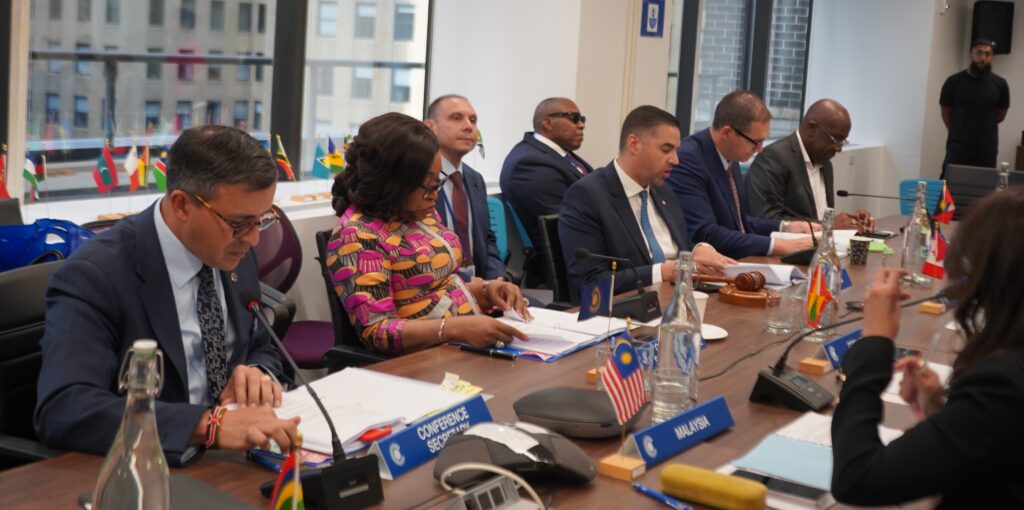By Prince Ahenkorah
Ghana’s ambition to transform its film industry into a globally recognized powerhouse was given fresh momentum at the National Film Dialogue, held on Tuesday, September 16, 2025, at the Cedi Hall, University of Ghana, Legon.
The event, which brought together stakeholders, policymakers, and creatives, underscored the government’s drive to leverage digital technology as a catalyst for building a vibrant, competitive film sector.
Delivering remarks on behalf of the Minister for Communication, Digital Technology and Innovations, Hon. Samuel Nartey George (MP), the Deputy Minister, Hon. Mohammed Adams Sukparu (MP), emphasized that film is one of the purest forms of communication, transcending words and geographical boundaries to capture emotions, culture, and the very identity of the people.
He noted that Ghana has a unique story to tell, and in the digital era, these stories can now travel to global audiences at the speed of a click.
Citing examples, Hon. Sukparu pointed to The Burial of Kojo, a low-budget Ghanaian film that broke barriers by securing global distribution on Netflix, earning international recognition and placing Ghana’s storytelling on the world stage.
He further referenced the ingenuity of young animators in Kumasi, who, despite limited resources, are using open-source software and online tutorials to create animated shorts gaining viral attention on TikTok and Instagram.
The Deputy Minister also spotlighted the success of a NAFTI student-produced documentary on cocoa farmers, which was recently showcased at a European Development Conference.
He explained that such international breakthroughs were made possible by digital editing tools and online platforms that lower entry barriers for Ghanaian creatives.
These examples, he stressed, “show how digital innovation is not just complementing the film industry, but revolutionizing it, giving local content global visibility.
Outlining government’s broader strategy, Hon. Sukparu explained that President John Dramani Mahama’s administration is pursuing a comprehensive digital agenda aimed at equipping the creative industry with the infrastructure and skills needed to thrive.
This includes expanding internet connectivity across the country, ensuring young creatives, whether in Accra, Kumasi, Tamale, or Takoradi, can access modern technological tools to tell their stories.
Beyond infrastructure, the government is deliberately investing in capacity building, training the next generation of filmmakers, editors, animators, and sound engineers with cutting-edge digital skills.
The Deputy Minister stressed that the film industry is more than entertainment, it is a driver of job creation, tourism, education, and national identity.
Hon. Sukparu also called for strategic partnerships between technology providers and creative industry players to unlock new opportunities.
Drawing inspiration from South Africa’s virtual production studios, Nigeria’s booming Nollywood distribution networks, and Kenya’s adoption of blockchain for royalty payments, he urged Ghana to adapt and innovate in similar directions.
“The government is committed to cultivating these partnerships and creating an ecosystem where creativity and technology merge seamlessly,” he said. “We are determined to make Ghana a hub for film innovation on the continent.”
Reaffirming the Ministry’s unwavering support, Hon. Sukparu pledged that government will stand shoulder-to-shoulder with filmmakers, investing in infrastructure, supporting content creation, and helping to amplify Ghana’s stories on the global stage.
“Film is not just entertainment; it is the heartbeat of culture and a mirror of society. With digitalization, our filmmakers have endless possibilities to tell Ghana’s story loudly, proudly, and globally,” he concluded to resounding applause.
The National Film Dialogue, which gathered industry veterans, upcoming talents, and global partners, marked not only a conversation about Ghana’s cinematic future but also a subtle reminder that the country is scripting its quiet but determined bid to compete with the world’s leading film industries.


